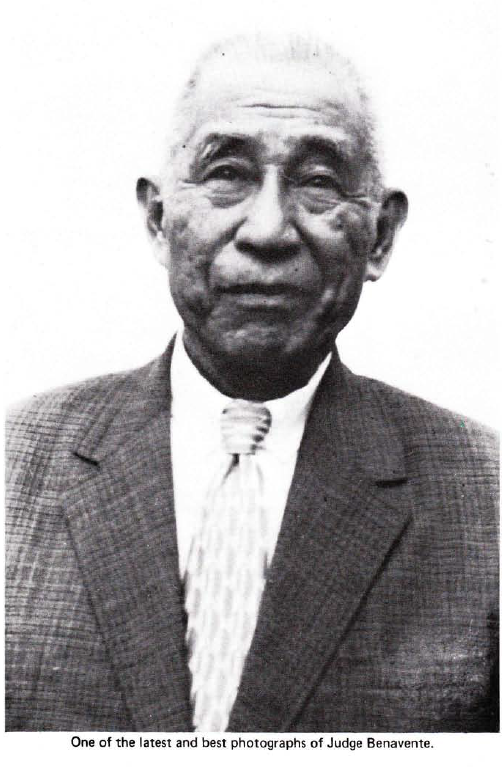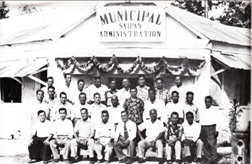(Note: The source of this information and photos are from the, “Footprints on the sands of time: Judge Ignacio V. Benavente,” by Sister Felicia Plaza, MMB, published in the Guam Recorder, 1976, Volume 6.)

During Tun Ignacio’s early years, his schooling from 1905 to 1913 was under the German administration. He was known to have a knack for quickly absorbing languages and mastered Spanish and German early on in life. While on Guam in the early 1920’s and taking care of his sick grandmother, he learned English. Later in life he would become self-taught in reading and writing French and prior to his death he was in the process of learning Russian. He was a very intelligent man indeed, despite never having completed college.
From 1913-1915 he worked on the island of Yap as a cable and radio operator. From there he was transferred to Saipan where he stayed until 1937. In 1937, he decided to move his wife and children to Yap where he bought enough land for his family. He did not want to stay on Saipan after observing that over 20,000 Japanese had taken over the economic progress of the Chamorro people, for the sake of the Japanese government’s support of the Sugar Company.
While in Yap, Tun Ignacio served as Commissioner for the Chamorros from 1942-1946. He also became a Deacon for the Catholic Church, when the Japanese expelled all Catholic missionaries. As a side note, some of these Catholic missionaries were imprisoned in Palau and later beheaded by the Japanese. So in the absence of the Catholic missionaries from 1944-1946, it was he who baptized children, led the services and witnessed the marriages in Yap.
From 1946-1948 Tun Ignacio worked for the United States Commercial Company. In 1947, he was sent to Hawaii for one year to attend a special agricultural extension course. Upon his completion in 1948, he became the agricultural agent for Saipan.
In 1950, he made another trip to Hawaii and while there and under the joint auspices of the Navy and Pacific Sciences Board, he was able to study the sugar industry, soil conservation and the raising of coffee.
 From 1949-1952 he was active in the Saipan Congress. From 1951-1953 he served as the Judge of the District Court, Mariana Islands, and Special Judge of the High Court. From 1953-1963 he served as the Mayor of Saipan. Following that he was back on the bench of justice and served another eight years from 1963-1975.
From 1949-1952 he was active in the Saipan Congress. From 1951-1953 he served as the Judge of the District Court, Mariana Islands, and Special Judge of the High Court. From 1953-1963 he served as the Mayor of Saipan. Following that he was back on the bench of justice and served another eight years from 1963-1975.
On April 27, 1974, the late Archbishop Felixberto C. Flores honored Tun Ignacio with a Papal Award, the Benemerenti Medal.
Tun Ignacio was very active and instrumental in moving forward stronger political status relations with the U.S. He was alive to witness the Northern Marianas approval of the covenant to establish the Commonwealth of the Northern Marianas political union with the U.S. on June 17, 1975.
Three days later on June 20, 1975 the Chamorro people would mourn the unexpected and sudden death of Tun Ignacio. His death occurred shortly after performing what would be his last charity visit to a friend who was ill and lonely. Tun Ignacio left behind an incredible legacy described as “one who was symbolic of the finest and the best in the heritage of the Chamorro people.”

